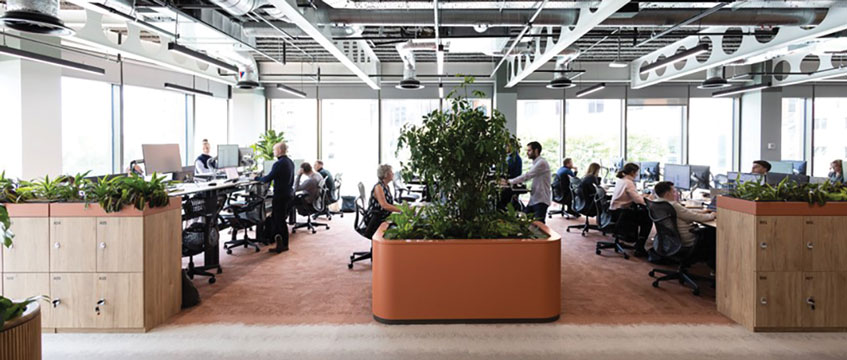Delivering sustainable operations for offices
There is groundswell of interest in sustainability from corporate occupiers. Globally, more than 4,000 companies have set public net-zero science-based climate targets.
This translates to city-level real estate demand for net-zero carbon buildings far outstripping supply. For example, 8m sq ft of net-zero carbon buildings are currently in the pipeline for London between now and 2026. But demand is far higher, with almost 20m sq ft of office space required by 2030.
JLL research also highlights that occupier action is falling short in practice, with over 60% of respondents to a 2023 survey citing barriers, including lack of expertise, data, planning and budget, to implementing measures that would decarbonise their buildings.
There is groundswell of interest in sustainability from corporate occupiers. Globally, more than 4,000 companies have set public net-zero science-based climate targets.
This translates to city-level real estate demand for net-zero carbon buildings far outstripping supply. For example, 8m sq ft of net-zero carbon buildings are currently in the pipeline for London between now and 2026. But demand is far higher, with almost 20m sq ft of office space required by 2030.
JLL research also highlights that occupier action is falling short in practice, with over 60% of respondents to a 2023 survey citing barriers, including lack of expertise, data, planning and budget, to implementing measures that would decarbonise their buildings.
The real estate life cycle
An end-to-end real estate life cycle approach enables the most complex sustainability goals to be realised.
The formula of integrating the required criteria at the optimal points in the real estate life cycle and embedding across the activities of all professionals involved is the key to maximising the chance of success.
This means from the early stages of site selection, green leasing negotiations with landlords and fit-out specifications, through to operations and procurement contracts for the range of services for corporate occupiers. Each step requires the appropriate sustainability criteria – across energy, water, waste, biophilia, renewable energy and more – to be integrated in a way that is tailored to an occupier’s priority goals for sustainability.
For example, if an occupier aims to be a zero-waste company in their operations, this starts with ensuring their landlords are committed via green lease terms, smartly incorporated into a new office fit-out and followed through to the catering, cleaning contracts and staff engagement. Missing a step to coordinate these requirements through this real estate life cycle increases the barriers, creates inefficiencies, and reduces the likelihood of achieving their goal.
Responding to these challenges, JLL’s sustainable operations service provides a dedicated sustainability integration program manager to coordinate across the entire corporate occupier life cycle, whether this means coordinating across multiple service providers or a fully managed A-Z service.
This programmatic approach enables occupiers to leap forwards, from the more traditional practice of identifying energy-efficiency cost-saving measures with the most attractive payback periods for utility bill reductions, to aiming for transformative change that realises the full value of sustainability goals.
An example of this shifting scope is in the recognition that healthier workplaces contribute to an uplift in workforce productivity.
Wellbeing and adding value
Akin to providing the optimal training conditions for athletes, corporate occupiers are optimising internal air quality, temperature, light, biophilia and more, which is beginning to predict returns on investment to global corporate profitability, further evidencing the importance of employee wellbeing.
Moreover, corporate occupiers are increasingly benchmarked publicly, not via GRESB, but through a series of indices, such as the Dow Jones Sustainability Index, CDP or EcoVadis supply chain scores. These scores rate both sustainability goal ambition and progress to achieving those goals, in turn informing stock market investors in their company shares and their clients’ tender scores. Overall, the value from reaching ambitious and holistic sustainability goals deepens.
JLL globally manages 2bn sq ft of occupiers’ real estate and we have evolved our global energy and sustainability services to deliver the needs of our most ambitious clients. Recognising our role in supporting the real estate sector to deliver net zero, JLL has set a pioneering target to achieve net-zero carbon by 2040 across all of its operations – including the sites we manage on behalf of our clients.
JLL’s commitments
To lead the way and learn from our own experiences, JLL has committed to net zero across our own global corporate real estate portfolio by 2030 and we are exceeding the performance trajectories required to achieve this.
Optimising the operational energy efficiency of our workplaces is a core commitment for JLL, and energy consumption across our UK estate, for example, has reduced by almost a third per office employee since 2019. This has been achieved through taking a life cycle approach, prioritising energy efficiency in fit-outs, procurement and implementing operational controls.
This is complemented by collaboration with JLL’s landlords. Seeking out partners who share our ambition enables a stronger outcome, including procuring up to 100% certified renewable energy and, in some cases, receiving industry recognition with JLL’s latest London fit-out at 20 Water Street winning the Edie Award for Circular Economy Innovation of the Year in 2023. Through sustainability support to our occupier clients’ portfolios, JLL has saved $300m+ (£234m+) in energy costs and prevented 65,000+ metric tons of CO2 emissions, on average delivering $2.79 in no or low-cost savings for every $1 in paid support.
This approach now increasingly taken to integrate sustainability into the occupier life cycle has evolved the programmatic asset management service and is now recognised as a vital strategy to achieve sustainability goals.
Charlotte Breen is global sustainability lead at JLL Workplaces











